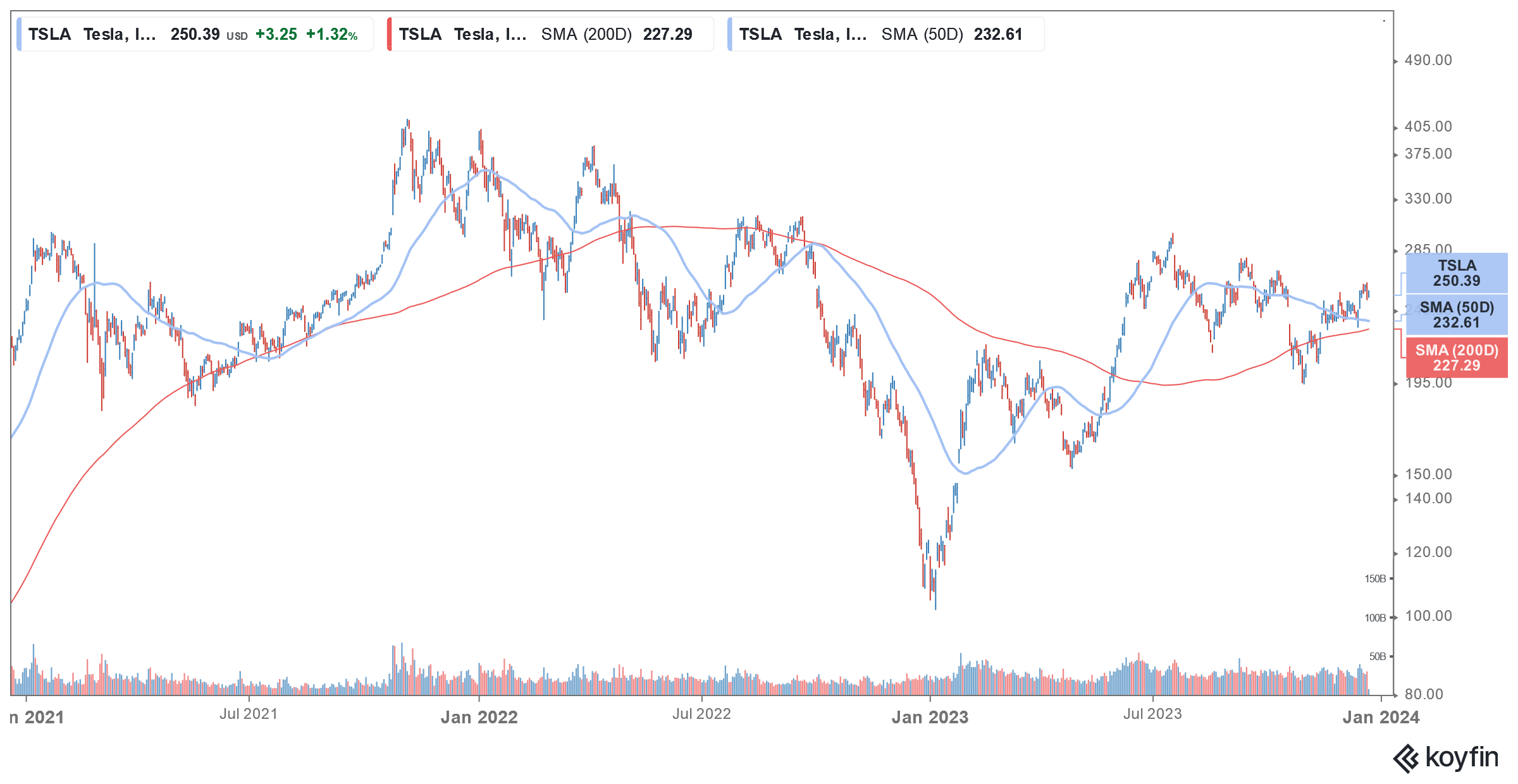Tesla Recall Woes Intensify as Norway Begins Suspension Failure Probe
Please note that we are not authorised to provide any investment advice. The content on this page is for information purposes only.
Tesla’s recall woes could intensify as Norway’s traffic safety regulator has launched an inquiry into suspension failures. Tesla recently recalled all its vehicles in the US to update software.
After complaints by some owners in the country, the regulator is investigating Tesla’s Model S and X vehicles, which are premium vehicles from the electric vehicle giant.
Tor-Ove Satren, senior engineer at Norwegian Public Roads Administration (NPRA) said that it could ask Tesla to replace rear lower control arms in Model S and X vehicles if it determines they pose a “serious risk.” The agency could issue an order before Christmas and has the authority to order a recall if Tesla does not do so voluntarily.
Tesla might need to recall vehicles in Norway
Meanwhile, according to NPRA records obtained by Reuters, one user complained, “Control arm broken off. This is a damage MANY other Teslas have received. Direct traffic hazard.”
Another customer said, “On Saturday, the suspension broke on our Tesla Model S, only luck that no serious accident happened.” The report added that Tesla has been blaming these issues on “driver abuse” fearing higher warranty costs.
Notably, Tesla recalled vehicles earlier this year to update the self-driving software. However, Tesla CEO Elon Musk said that it is not a “recall” and tweeted, “The word ‘recall’ for an over-the-air software update is anachronistic and just flat wrong!”
Tesla faces labor union’s ire in Scandinavian countries
Meanwhile, the possible recall in Norway only adds to Tesla’s troubles in Scandinavian countries where its employees are looking to unionize. Tesla as well as Musk have spoken against unionization and none of its employees globally are unionized.
Tesla’s troubles in Scandinavian countries began in October when nearly 130 mechanics at 10 Tesla garages in Sweden walked off the job after the company declined to sign a collective buying agreement with them.
These workers are getting support from other workers across the region and members of Sweeden’s transport union have threatened to stop collecting waste from Tesla’s service centers beginning this Sunday.
Elsewhere, dockworkers in Denmark have stopped unloading Tesla cars at the ports while unions in Norway and Finland are also contemplating joining the strike.
Jorn Eggum, the president of Norway’s United Federation of Trade Unions said, “The right to collective bargaining agreements is a natural part of the labor market in the Nordics and we cannot accept that Tesla stands outside of this system.”
According to Sweden’s union IF Metall collective bargaining agreements allow “for companies to operate on a level playing field, while avoiding the risk of any one employer distorting competition in the sector by imposing poor conditions on their employees.”
TSLA is looking to hire a public policy expert in Nordics
Notably, postal workers in Sweden have stopped delivering Tesla license plates and while Tesla initially got a reprieve from the court, it was soon reversed. Matthias Schmidt, an independent auto analyst believes that Tesla erred in looking for a quick legal win in the license plate case “appears to be having precisely the opposite impact, making unions more steadfast and creating sympathetic actions across the country.”
Meanwhile, amid mounting pressure in the region, Tesla is looking to recruit a public policy expert in the Nordics.
A job posting on its website says that it is looking for a “Public Policy and Business Development Manager, Nordics” and “The role is to help ensure that the political, regulatory and fiscal frameworks in the ‘Nordics’ (Norway, Sweden, Denmark, Finland and Iceland) support Tesla’s mission.”
The posting says that the ideal candidate should have a “Significant experience with Nordic legislative and regulatory advocacy is needed. Issue area expertise is a plus but not required since with the right attitude the learning curve can be steep.”
Could UAW target TSLA next?
Meanwhile, while Tesla does not have many employees in the Nordic region, markets fear that if the company caves in and allows unions at its facilities in the region, it could have a ripple impact on its other operations – especially in Europe and the US.
Tesla has a factory in Berlin and two in the US, in Freemont and Austin. UAW has already started a bid to unionize employees at Tesla and other non-union automakers.
UAW recently scored big wins against the Detroit Big 3 which includes Ford, General Motors, and Stellantis, which had to offer massive pay hikes after the unions went on strike at key plants. These hikes would lead to billions in dollars in cost for these automakers.
General Motors for instance expects additional costs of $9.3 billion until the term of the contract 2028 which translates into an additional cost of $575 per vehicle. Ford said that the additional costs from the contracts would total $8.8 billion or around $900 per assembled vehicle.
Ford and GM scale back EV investments
Meanwhile, amid slower-than-expected demand for electric cars, both Ford and GM are scaling back their EV plans.
In July, Ford toned down its ambitious EV program and said that it would hit an annual production capacity of 600,000 by 2024 instead of 2023. It also rolled back the targeted production capacity of 2 million cars and said that it would be “flexible” about the timing – instead of reaching the goal in 2026 as previously stated.
During the Q3 earnings call, Ford’s CFO John Lawler said, “The transition to EVs is well underway. Adoption is growing, even if pace is slower than what the industry, including us, expected.”
He added, “Along the way, we’re going to balance production of gas, hybrid and electric vehicles in ways that many companies can’t, based on what consumers want.”






